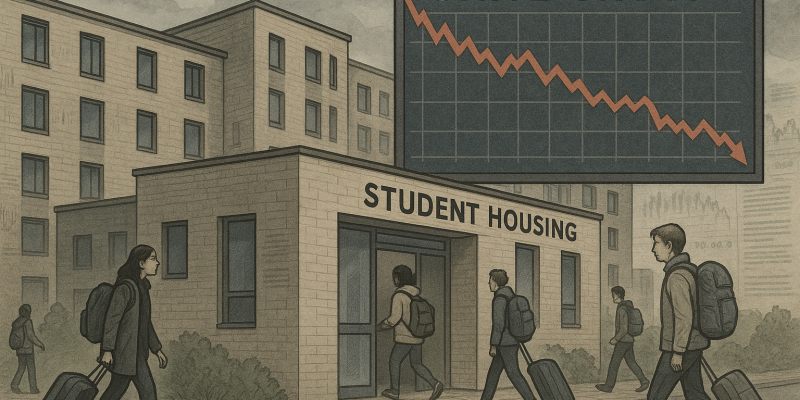
Britain’s largest student accommodation provider, Unite Group Plc, has seen its share price fall to its lowest level in more than ten years after issuing a stark outlook for the coming year.
The company warned that earnings could drop by as much as 10% in fiscal 2026, the latest sign that student housing – once one of the most resilient corners of the UK property market – may be losing momentum.
Shares in Unite slid as much as 7% in early London trading on Thursday, touching 507.50 pence, a level not seen since 2015.
The stock has recovered slightly and was trading at 516.61 pence at the time of writing.
The stock has already declined over 36% year-to-date, reflecting investor concerns over weaker occupancy trends and mounting operational costs.
The selloff comes amid signals that underlying demand from certain international student groups is softening, while rising supply has intensified competition in key university cities.
Earnings outlook weakens as occupancy falls
In a trading update, Unite said it expects adjusted earnings to fall between 7% and 10% in 2026, citing lower occupancy, reduced property activity, and higher finance costs.
Chief Executive Officer Joe Lister acknowledged market headwinds, pointing to “weaker demand and higher supply in some cities,” which has pressured performance.
For the 2025–26 academic year, Unite reported 95.2% of beds sold – the lowest level since the pandemic.
Reservations for the following year currently stand at 62%, broadly in line with the same period last year, but the company is now targeting a reduced occupancy range of 93% to 96% for 2026/27.
Rental growth is also expected to moderate, with the firm guiding for an increase of just 2% to 3%, compared with 4% achieved in 2025/26.
Although bookings from international students have remained broadly stable, uncertainty surrounding demand – particularly among Chinese postgraduate tenants – has weighed on sentiment sector-wide.
Rival developer Empiric recently reported a 6% decline in occupancy, citing a fall in reservations from Chinese students.
Both companies have flagged the impact of geopolitical tensions and rising living costs on overseas enrolment trends.
Regulatory clearance for Empiric acquisition
In a separate development, the UK’s competition authority approved Unite’s £634 million acquisition of Empiric Student Property, clearing a major hurdle toward sector consolidation.
The deal is expected to strengthen Unite’s position within the purpose-built student accommodation market, even as near-term earnings face pressure.
The company said it plans to continue refining its portfolio through strategic asset disposals and deeper partnerships with high-tariff universities, responding to a shift in demand toward more selective institutions.
While adjusted earnings are set to decline in 2026, Unite expects growth to return from 2027, supported by capital recycling and operating efficiencies.
Sector outlook shifts after years of strength
Student housing has long been viewed as a defensive real estate segment, buoyed by chronic undersupply in many university towns.
But increasing development, coupled with uncertainty around international student flows, has begun to temper rental growth expectations.
For Unite, the coming year represents a reset after a decade of solid expansion.
While fundamentals for the long term remain underpinned by sustained UK higher education demand, the immediate focus will be on stabilising occupancy, navigating cost pressures, and integrating Empiric to drive scale efficiencies as the market recalibrates.
The post Unite Group shares sink to decade low as student housing demand softens appeared first on Invezz








